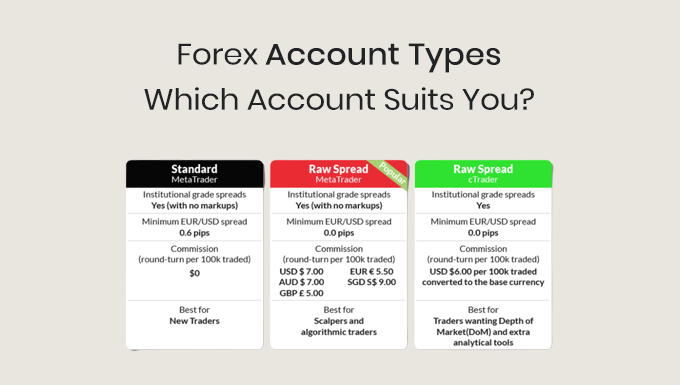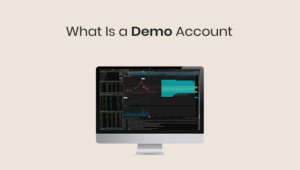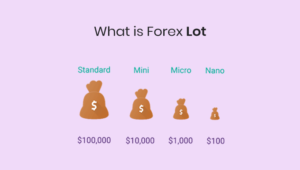When you start forex trading, one of the first things you’ll have to do is selecting the right account type. Just as every trader has unique goals, risk tolerance, and strategies, Forex brokers offer various account types tailored to meet these differing needs. Whether you’re a beginner looking to get your feet wet or a seasoned pro seeking high volume trades, understanding the different forex account types is important.
A common misunderstanding is that one account fits all. But, in reality, there are a lot of different accounts available. Some cater to beginners, while others are designed for experienced traders. This article explains the details about different forex account types and talks about their distinct features and benefits, which will help you make an informed decision, ensuring a smoother trading experience.
Table of Contents
• Mini and Micro Accounts
• Cent Accounts
• Raw Spread Accounts
• Managed Accounts
• ECN Accounts
• Demo Accounts
• Copy Trading Accounts
• Conclusion
• FAQs
Standard Accounts
Standard accounts, as the name suggests, are the most common types of accounts in the Forex market. Ideal for intermediate and experienced traders, they generally require a higher initial deposit compared to other account types. However, this higher capital requirement often comes with several advantages.
One of the primary benefits of a standard account is the full-size contract or lot. In Forex terms, a standard lot equates to 100,000 units of the base currency. This means that for every pip move, the change in value is roughly $10. Such size allows traders to capitalize on smaller market moves and provides higher potential returns, although it also comes with increased risk.
Furthermore, traders using standard accounts usually get better spreads and have access to more extensive resources and tools from their brokers. This includes research, market analysis, and sometimes even dedicated account managers. The combination of these features makes standard accounts a favorite among many Forex traders.
Mini and Micro Accounts
For traders who are not quite ready to tackle the standard accounts, mini and micro accounts offer a gentler introduction to the Forex world. Requiring a smaller initial deposit, these accounts are perfect for beginners or those who prefer to trade with lower capital.
A mini account deals with a tenth of the size of a standard account, meaning each lot is 10,000 units of the base currency. This translates to a pip value of around $1. On the other hand, a micro account takes it even further down, with one lot being only 1,000 units, making the pip value a mere $0.10.
Such accounts reduce potential losses, making them an excellent choice for traders who are still learning or are more risk-averse. The smaller lot size provides a comfortable environment to learn, practice strategies, and get familiar with the dynamics of the Forex market without risking significant capital.
Cent Accounts
Cent accounts are a fantastic bridge between demo accounts and live trading accounts, especially for beginners. As the name suggests, cent accounts allow traders to trade in cents, reducing the amount of capital at risk.
Typically, when depositing $10 into a cent account, it will appear as 1,000 cents, giving the feeling of trading with a larger balance. This type of account is invaluable for traders who want to experience real market conditions without risking significant amounts of money. It offers an opportunity to get familiar with order execution, managing trades, and adapting to market volatility, all while preserving most of your capital.
While cent accounts can provide invaluable experience, they do come with a few limitations. The spreads may be slightly higher than standard accounts, and the available leverage might be limited. Despite these drawbacks, they’re an excellent stepping stone for those transitioning from a demo account to real trading.
Raw Spread Accounts
Raw spread accounts are among the most transparent types of Forex accounts available to traders. They are designed to provide traders with direct access to market prices without any mark-up, which means that the spreads are as thin as they can get, often starting from 0.0 pips. This is achieved by offering trades directly from liquidity providers, bypassing any intermediaries.
For traders, the primary advantage of a raw spread account is the reduced trading cost. Instead of paying a wider spread, traders typically pay a commission on their trades. This structure can be especially beneficial for high-frequency traders or scalpers who make several trades in a short time frame.
However, it’s essential to note that while the spreads can be extremely low, the commission costs can add up, especially if the trading volume is significant. Therefore, traders should analyze the overall cost structure (spread + commission) when considering a raw spread account.
Managed Accounts
Not every Forex enthusiast wants to actively trade. Some may prefer to invest in the market without the daily hassles of monitoring charts and executing trades. This is where managed accounts come into play. These are accounts where a professional trader or a team of traders handle the trading on behalf of the account owner.
Typically, the account owner will deposit their trading capital, and the manager will take a percentage of the profits as compensation. The primary advantage of this setup is leveraging the expertise of seasoned professionals. Traders can benefit from the Forex market without needing the intricate knowledge or spending time on research and analysis.
However, there’s a downside. Since managers take a portion of the profits, the returns might be lower than if you were trading yourself. Plus, finding a trustworthy and skilled account manager is crucial. Before diving into managed accounts, thorough research and due diligence are paramount.
ECN Accounts
ECN stands for “Electronic Communications Network.” An ECN account offers traders direct access to the interbank market. Instead of trading against the broker, traders with ECN accounts trade directly against the market, which can lead to better price quotes and faster execution times.
ECN accounts typically come with tighter spreads, but brokers charge a commission for each trade. This setup might be more cost-effective for frequent traders, as the commission structure can offset the narrower spreads.
Additionally, since traders access the market directly, there’s less chance of price manipulation. This level of transparency can be reassuring for many traders, knowing they’re getting a fair price. It’s worth noting, though, that ECN accounts might require a more substantial initial deposit compared to standard or mini accounts.
Demo Accounts
Many brokers let traders practice with demo accounts before they go live on the real forex market. These accounts come with virtual money, allowing traders to experience the live market without any real capital at stake. It’s a risk-free environment to learn the ropes, test strategies, and familiarize oneself with the trading platform.
While demo accounts are great for beginners, even seasoned traders use them to test new strategies or get accustomed to a new trading platform. It’s a reminder that in the dynamic world of Forex, continuous learning and adaptation are key.
However, traders should be aware that while demo accounts simulate the real market, the emotional dynamics of trading with real money can be very different. It’s always recommended to start small when transitioning from a demo to a live account to understand and manage the psychological aspects of trading.
Copy Trading Accounts
Copy trading, sometimes referred to as “social trading,” allows individuals to automatically copy the trades of experienced and successful traders. This account type is beneficial for those who might not have the time, expertise, or confidence to trade on their own.
When you use a copy trading account, every time the trader you’re copying opens a trade, the same trade is automatically executed in your account proportionally based on the funds you’ve allocated. If they profit, so do you, and if they lose, your account sees a proportional loss.
The beauty of copy trading is the diversity it offers. You can choose to follow a single trader or multiple traders, depending on your preference. Before choosing whom to follow, it’s essential to review their trading performance, strategies, risk profile, and duration of trading. This ensures that you’re aligning with traders who match your risk appetite and investment goals.
However, while copy trading can be a passive way to engage in the Forex market, it’s crucial to remember that all trading involves risk. It’s always advisable to only invest funds that you can afford to lose and continuously monitor and evaluate the performance of traders you’re copying.
Conclusion
Choosing the right forex account type an significantly influence the journey’s success and experience. With number of forex account types ranging from standard, cent, and demo accounts to more specialized ones like ECN, managed, and copy trading accounts, there’s a fitting choice for every trader’s strategy, capital, and risk appetite. The key is to understand the basics of each forex account type, align them with one’s goals, and enter the market well-prepared.
FAQs
1. How does leverage differ across various account types?
Leverage, which allows traders to control a larger position with a smaller amount of money, can vary significantly between account types. While standard accounts might offer higher leverage due to their larger capital requirements, other accounts like ECN or cent accounts might offer reduced leverage. It’s essential to consult with the broker regarding the specific leverage options for each account type.
2. Can I switch between account types with the same broker?
In many cases, yes. Brokers often allow traders to switch between different account types or even maintain multiple account types simultaneously. However, there might be certain prerequisites or conditions to be met, such as a minimum account balance or specific verification procedures.
3. Are there any account types specifically tailored for algorithmic or automated trading?
Yes, some brokers offer accounts optimized for algorithmic or automated trading. These accounts typically provide faster execution speeds, support for trading platforms like MetaTrader 4 or 5, and might offer VPS (Virtual Private Server) services to ensure that trading algorithms run 24/7 without interruptions.
4. Are there any specific requirements or qualifications needed to open certain types of Forex Accounts?
Some Forex account types, particularly specialized ones like managed or ECN accounts, might have specific requirements regarding minimum deposits, trading volumes, or even qualifications, which traders need to meet to open and operate them.
5. How can I ensure the safety of my funds with different Forex Account types?
Ensuring fund safety is paramount in Forex trading. Traders should inquire about the broker’s regulatory status, fund segregation policies, and protection schemes available for different account types to safeguard their capital.






